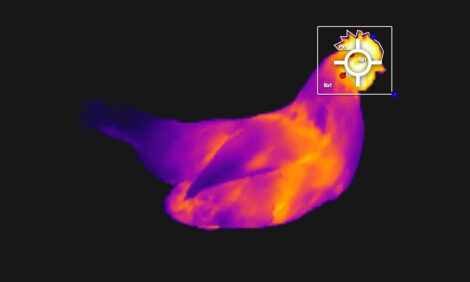



Outcome of an Artificial Coccidial Infection in Poults under the Influence of Floor Heating
Both the moisture content and temperature of the litter affected the progress of coccidiosis in young turkeys, according to a new study at Hannover University.In work published recently in Poultry Science, researchers based at the University of Veterinary Medicine Hannover, Foundation in Germany state that coccidiosis is one of the most prevalent diseases in poultry.
The objective of their reported study was to determine the effects of floor heating when poults were artificially infected with Eimeria regarding the outcome of the infection and secondary effects on litter quality and health of the foot pad, according to Professor Josef Kamphues from Hannover and co-authors there and at Mansoura University in Egypt and the French Agency for Food, Environmental and Occupational Health & Safety (ANSES).
Two trials were performed. In each trial, four groups of two-week-old turkeys were reared for a four-week period. All birds were fed ad libitum identical pelleted diets without any anticoccidial additive. The first two groups were housed on dry wood shavings, with and without floor heating; the other two groups were housed on wet wood shavings (35 per cent moisture, achieved by adding water as required), with and without floor heating.
Two birds only (primary seeder birds; the other 18 birds were nominated as secondary infected birds) in each of the four groups were experimentally infected orally with Eimeria adenoeides (around 50,000 oocysts per bird). The number of oocysts eliminated via excreta was determined repeatedly. On day 42, each bird not only was scored macroscopically for coccidial lesions in the caecum but also oocyst counts were determined in the caecal contents.
Finally, the foot pads were assessed weekly for external scoring and on day 42 of life for histopathological scoring.
Although the counts of oocysts in seeder birds were almost identical on day 6 post-inoculation, oocyst counts in excreta of secondary birds were markedly reduced in both trials when the poults were not exposed to wet litter.
Moreover, in both trials using floor heating with exposure to wet litter resulted in a higher oocyst count in the excreta of secondary infected birds (3.72/3.92 in trials 1 and 2) on day 24 post-inoculation compared with the other groups.
Using floor heating resulted in significantly decreased foot pad dermatitis scores compared with groups housed without floor heating.
The Hannover-based researchers concluded the differences in oocyst counts indicate that the process of sporulation is affected by both the moisture and the temperature of the litter.
Reference
Abd El-Wahab A., C.F. Visscher, S. Wolken, L-M. Reperant, A. Beineke, M. Beyerbach and J. Kamphues. 2013. Outcome of an artificial coccidial infection in poults under the influence of floor heating. Poult. Sci. 92(3):629-637. doi: 10.3382/ps.2012-02614
Further ReadingYou can view the full report by clicking here.Find out more information on coccidiosis in turkeys by clicking here. |
April 2013








